Resident Evil: The Board Game preview - "A spine-tingling return to survival horror roots"
Step back into the hallways of the Spencer Mansion
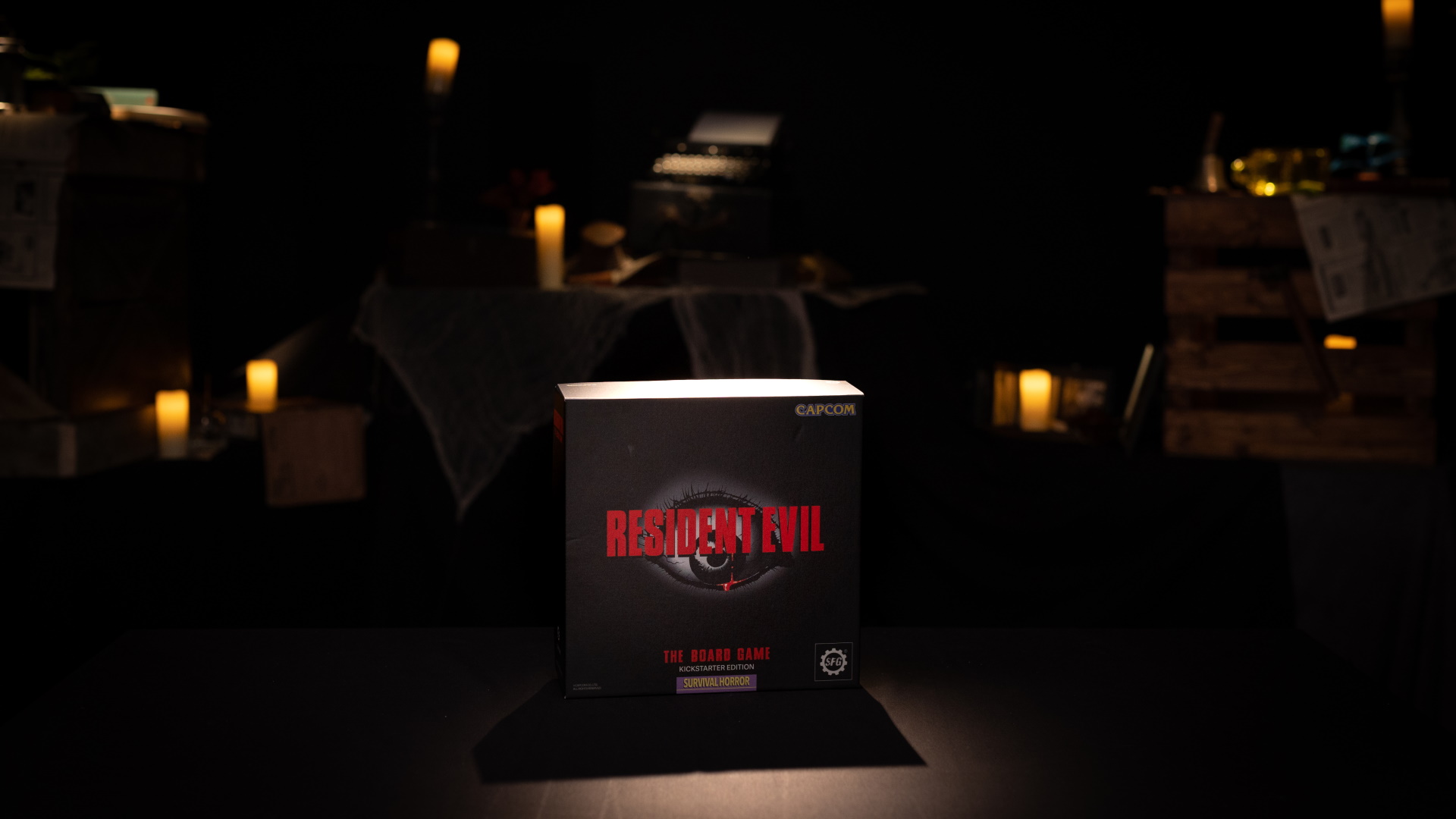
Fans of Resident Evil have been enjoying Steamforged Games' video game-themed adaptations for some time now, most recently with the launch of Resident Evil 3. However, the makers of some of the most haunting adventures to hit your tabletop have taken things right back to the start this time around.
Steamforged Games launched their Kickstarter for Resident Evil: The Board Game, a tabletop adventure seeing players through campaigns inspired by the original title, earlier last week. Since then, the funding drive has secured a whopping £927,037 ($1.2M) at the time of writing - not too shabby considering it was only aiming for £100,000 ($137,460). So far, the project has been a storming success, so I got my hands on an early digital playthrough to wander into the mansion myself to see if it deserves a place on our list of the best board games.
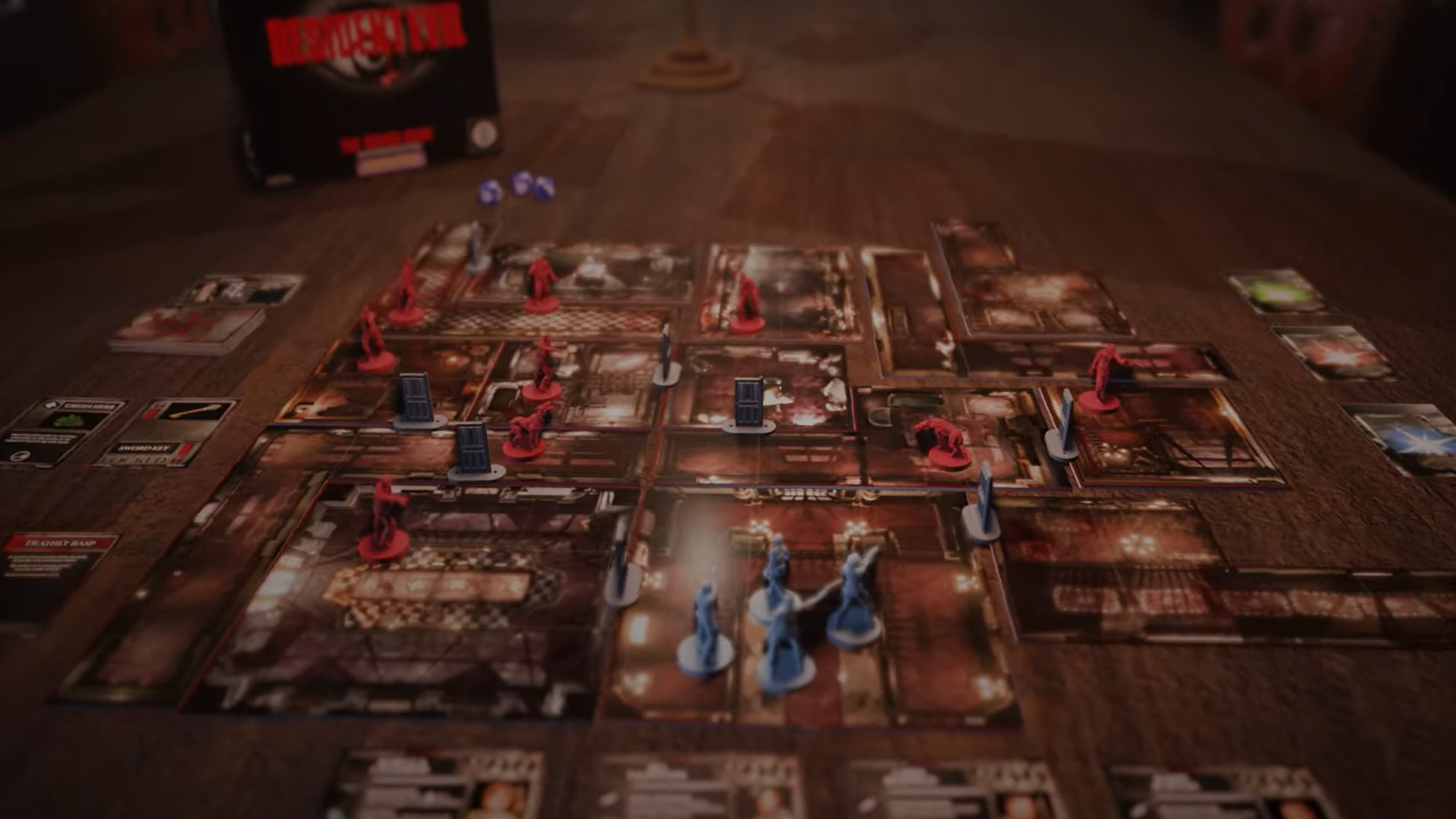
Game type: Co-op survival horror
Players: 1 - 4
Ages: 14+
Lasts: 90 mins
Release date: 2022
Publisher: Steamforged Games
If you've played earlier iterations of the Resident Evil board game franchise (or similar entries from our guide to the best cooperative board games), you'll be familiar with how this one works. Each turn is deconstructed into a movement / attack / pick-up-that-shiny-thing phase, the enemy's retaliation phase, and a final 'tension building' phase in which it could all go horribly wrong. From there, you move through the map, solving puzzles, hunting down the right keys to escape with, or desperately clawing your way to a rendezvous point so you can meet up with the rest of your team.
Of course, it's not just you shuffling through those hallways; zombies of all shapes and sizes are waiting to spring up and force you to change your gameplan at the drop of a hat (or the drawing of a card). In classic Resident Evil tradition, you'll also be manoeuvring through these deadly environments with limited ammunition, relying on the health sprays you find along the way.
Tiptoe back into the unknown
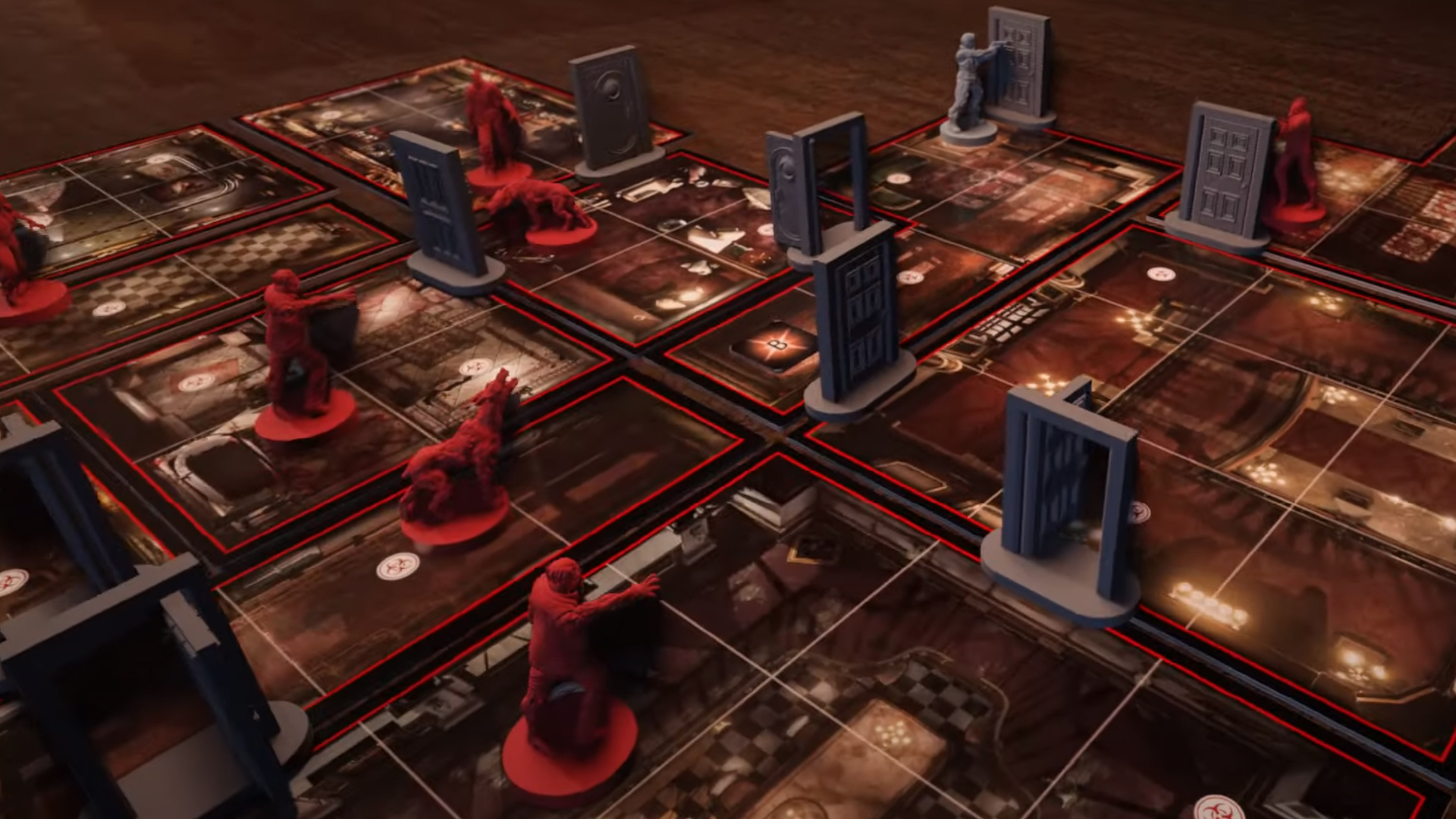
So, what's different? One of the biggest immediate changes to this routine that I noticed in my playthrough was the map itself. Rather than being able to view typewriters, enemies, and items from the outset, players are now faced with only a limited amount of information when the game starts. Closed doors still lead off into various different rooms, but - much like Betrayal at House on the Hill - these are only added to the map when discovered.
"It was a case of necessity leading into innovation" explains Sherwin Matthews, designer and writer. "I knew setup time was a bit of a barrier and wanted to come up with something where you're laying down tiles as you go so that it wasn't causing us to have 15 minutes of setup time each time you want to play."
More than cutting down on initial setup time, though, the overall effect of this new mechanic is strikingly powerful. Rather than planning my time and movement around the map, I was forced instead to take every step as it came, knowing that behind every door could be just the clue I was looking for... but that the encounter waiting for me could put an end to it all. Not only that, but not knowing where the nearest item box or typewriter was forced me to fully invest in the exploration side of the franchise.
Weekly digests, tales from the communities you love, and more
The map set-up also increases that classic sense of claustrophobia
Naturally, you'll have to watch your step. Movement, dodging, and positioning all play a large role in this franchise; with limited ammo, players need to carefully manipulate the enemies around them so that they have a clear line to their goal. And as more enemies pile into the cramped corridors or extravagant ballrooms of Spencer Mansion, the space you have at your disposal becomes another resource to manage. Not knowing the layout of the room you're stepping into next brings even more chaos to this universe.
"You can't plan ahead the same way as you do with Resident Evil 3 where you look at everything on the map and go 'right, what do we need to do?'" continues Matthews. "You can't say, 'well you go and flip the switch, you head for the save point, and then you go open that door'. You can't plan ahead with Resident Evil 1 at all."
Thematically, the map set-up also increases that classic sense of claustrophobia entrenched in Resi instalments that are more focused on survival-horror. Add this to the whims of the aptly named 'tension deck' (a random series of cards that can spawn extra zombies and inflict longer-lasting effects, carried over from previous RE board game releases), your own depleting ammo stores, and the need to see every player safely through the run, and you've got some heart-pounding decisions to make.
A crackle on the radio
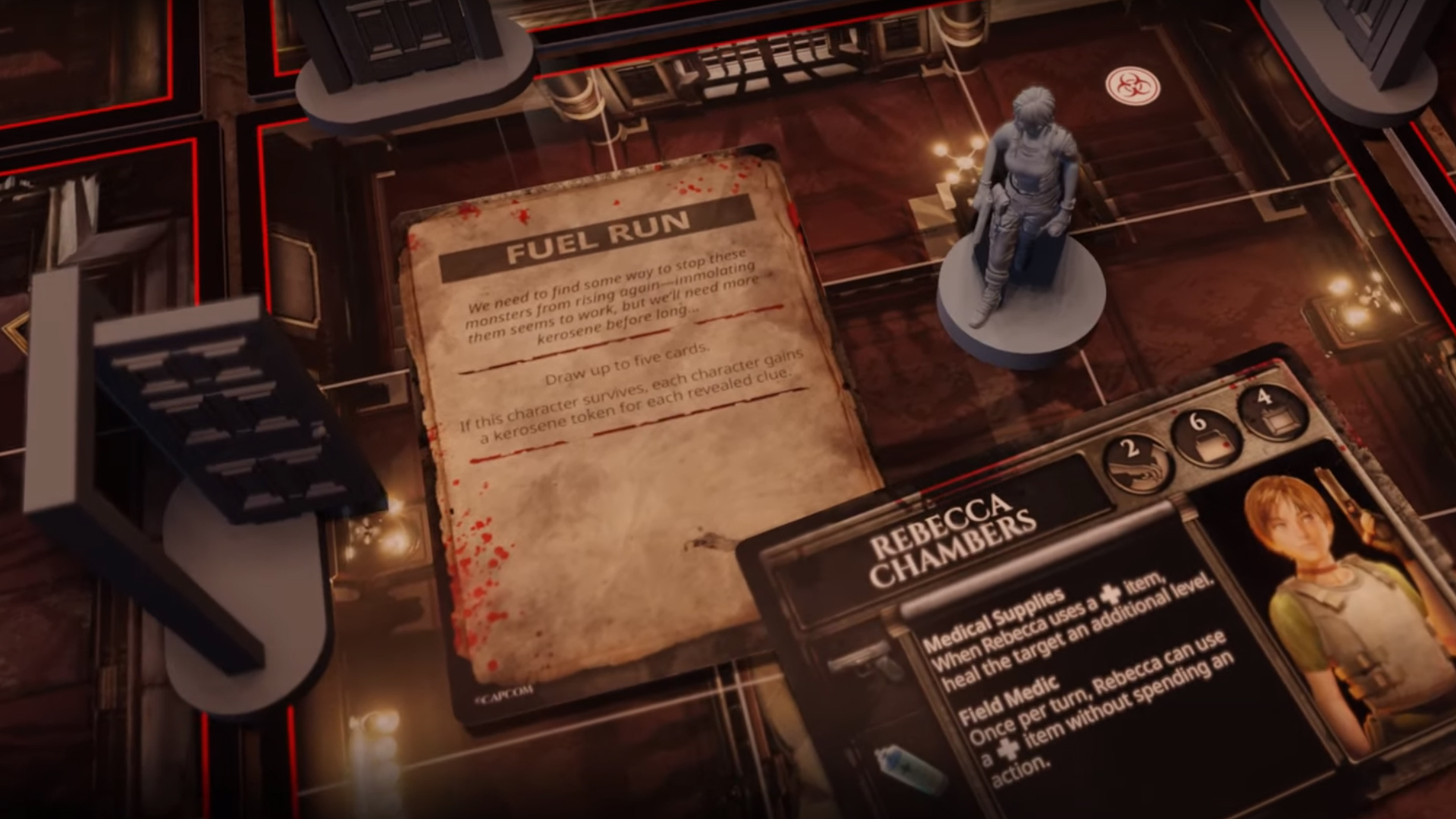
Towards the end of my playthrough (having found the Sword key to unlock my exit and dealt with a particularly nasty Hunter on the way out), I stumbled across a story token. This triggered another new mechanic in Resident Evil: The Board Game - missions. Some static springs to life over our radio and Barry crackles into earshot.
He's helping Brad Vickers escape a particularly bloodthirsty horde while we're having fun inside the mansion. Whether or not Barry succeeds is down to whether or not we can draw cards from a mission deck and get three magnifying glasses before hitting five wounds. If we fail, Barry doesn't make it through. If we succeed, both Barry and Brad can join us in the next stage of our campaign.
While not aimed particularly at the 90-minute single-run folk, those playing through a whole campaign will certainly appreciate the additional asides to be found throughout this world. It certainly made it feel far more like a living environment, tightly shrouded and claustrophobic by itself, but never too far from danger elsewhere.
The bones of survival horror have been transposed into a physical experience better than ever here
Another way Resident Evil: The Board Game feels like it's leaning more into the original gameplay experience is through new puzzle mechanics. While I didn't play through any of these in my preview, Matthews explains that certain scenarios will require players to activate emblem switches in a certain order (after finding them all first) in order to progress.
Considering how the majority of scenarios in Resident Evil 3 had players aiming to get from A to B, it's a refreshing shakeup. Instead of relying on tension cards and encounters to add variety to the recipe, the new puzzles require a fresh set of strategies.
That's especially true because the finer details of each puzzle are randomized during play. Namely, players draw face-down cards to determine which emblems need to be activated and in which order. If they get it wrong, the stack is shuffled and dealt again. This leaves them right back where they started.
Time is far more of a factor here, forcing you to play more aggressively during earlier moments and defensively during the end-game (one wrong emblem push could spell disaster). After spending some time with Resident Evil 3: The Board Game, it's easy to see that players will appreciate this change of pace.
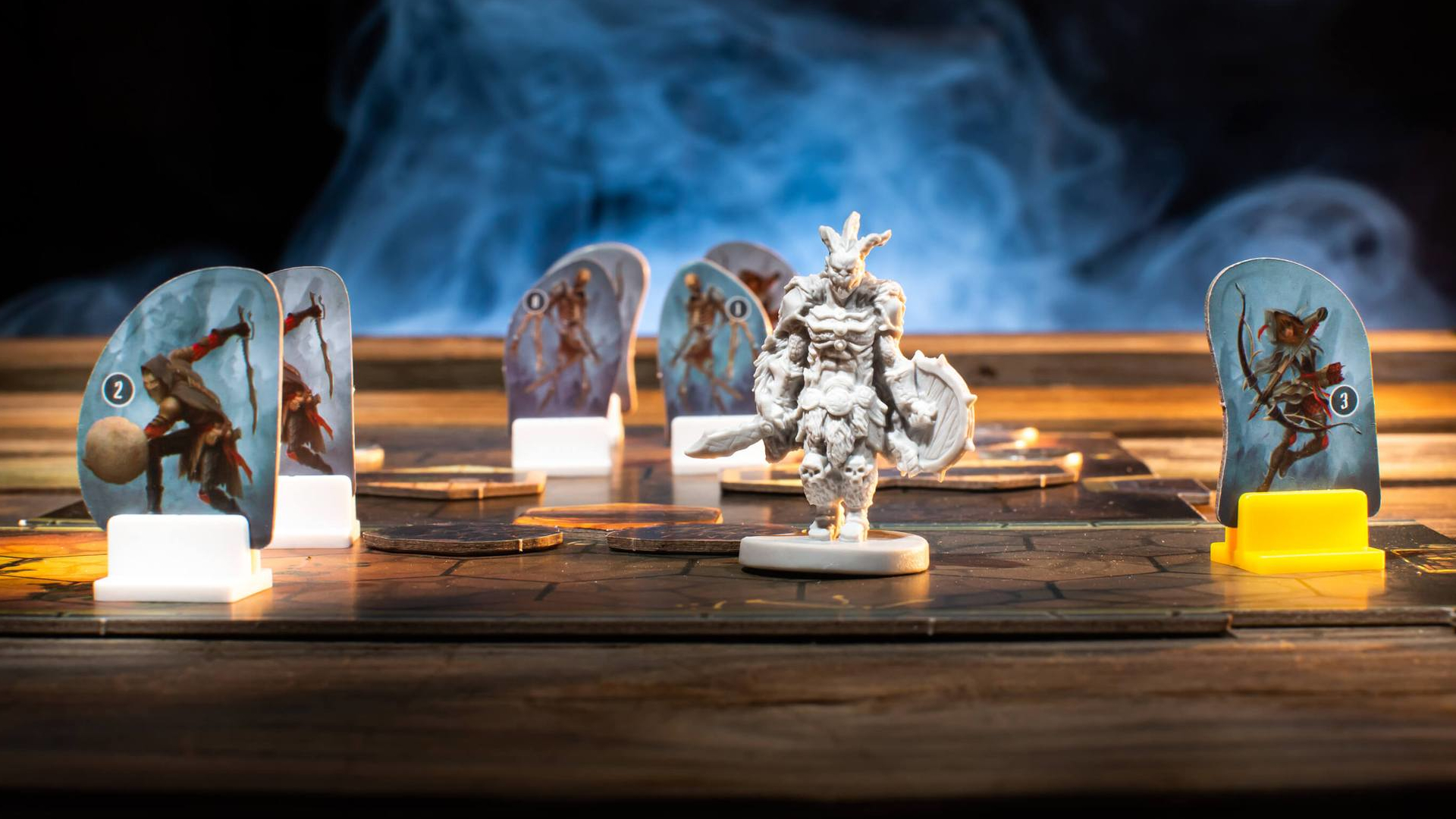
Board games for adults: Discover your new go-to for games night
Best party board games: All the latest crowd-pleasers, compared
From what I've seen so far, it's clear that Resident Evil: The Board Game takes the tabletop series back to its roots. The bones of survival horror have been transposed into a physical experience better than ever here, with the atmosphere of Spencer Mansion looming large over the play space and finer details of the classic Resi experience baked into each card. It's easy to see why Steamforged Games have had such a positive response so far, and I'm excited to see the final product in full - terrifying - swing.
If you're after more of a family-friendly games night, check out all the top board games for families or board games for kids. Or, take a look at the best card games currently available right now.

Managing Editor of Hardware at GamesRadar+, I originally landed in hardware at our sister site TechRadar before moving over to GamesRadar. In between, I've written for Tom’s Guide, Wireframe, The Indie Game Website and That Video Game Blog, covering everything from the PS5 launch to the Apple Pencil. Now, i'm focused on Nintendo Switch, gaming laptops (and the keyboards, headsets and mice that come with them), PS5, and trying to find the perfect projector.


